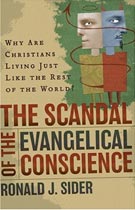I joke with my wife that during my youth and college days I kept moving so far to the right that I woke up one day on the left. I’m not the first person to undergo this strange metamorphosis and there may be very good reasons for it. However, before diving into the bubbling cauldron of political ideals, I should pause to defend this post as relevant to the Liberal Evangelical project.
Anyone who has read Lost in the Middle? and/or Found in the Middle! knows that one of the primary concerns of LiberalEvangelical.org is to create loving Christian communities centered around the life and witness of Jesus Christ. We believe that such communities have many important roles to play in the world, among these, Liberal Evangelical communities are dedicated to living in love with difference. Our focus is on finding ways to sustain heterogeneous communities in which peoples of different races, creeds, ethnicities and political persuasions can all worship together. Too many Evangelical churches create tightly knit homogeneous communities by focusing on ideological and doctrinal purity. We aim to be Liberal insofar as we shun purity in favor or inclusion. To this end, today’s post is dedicated to an odd topic: a spirited defense of Conservatism.
I am convinced that many Christian conservatives may have more in common with Liberal Evangelicals than one might expect, if we can look past tired culture war hot button issues and focus on deeper ideals and values.
Liberalism has at its root the notion of Liberty; liberty from tradition, from institutions, and from cultural authorities and norms. So of course Libertarianism and Liberalism share this linguistic and philosophical heritage. During the early modern period of European history, a time when powerful church hierarchies and monarchies controlled most aspect of social and personal behavior, Liberalism was an ideology that advanced the cause of personal freedom and autonomy (literally auto-nomos, self-governance). When used in this classical sense, “Liberal” is an overarching ideology that incorporates most modern Western conservatives and liberals. It is important for us to remember that almost all of our important political debates and disagreements are fight interior to classical Liberalism.
Americans have grown so accustomed to viewing almost all political disagreements through the Left/Right, Liberal/Conservative lens that we forget the fact that the entire spectrum of our debate is but a subset of possible political and cultural positions. So it is that I find it refreshing to note the similarities between Conservative Liberals (Libertarians) and Liberal Liberals (Liberals). Confusing enough or you?
Liberal Liberals like me tend to worry about the controlling influence of religious intuitions, cultural canons, class interests, oligarchs and big corporations.
Conservative Liberals like Libertarians tend to worry about the controlling influence of political institutions like the Federal Government, the IRS, and the EPA.
What classical Liberals of all stripes share is a desire to preserve the rights and freedoms of the individual in the face of powerful intuitions and traditions both formal and informal. And to be honest, I frequently find myself drawn in the direction of Libertarianism in large part because I share their concern for preserving autonomy. This is not, as the Rolling Stones might put it, sympathy for the devil, but rather a genuine desire to see in my frequent political opponents similar commitments and concerns. I see them not as enemies but as kindred thinkers, and it is my constant hope as a Liberal Evangelical that our shared commitment to Christ might win out over our political disagreements
Such high-minded sentiments can be difficult to maintain, especially in the face of birtherism and Tea Party faux populism, but I have to think that, at bottom, I have more in common with Conservatives than I have against them. To this end, I am going to conclude with an odd endorsement. I suggest that anyone interested in further understanding the interesting dynamics that tie together Liberals and Conservatives under the banner of classical Liberalism seek out the new e-book “The Graphic Guide to Conservatism” by Olivier Ballou. Too often the Glen Becks and Donald Trumps of the Right-wing seem to speak for all Conservatives. Ballou offers a thoughtful and historically nuanced introduction to the basic commitments and ideals of Conservative Liberalism and he does so in a manner that is both entertaining and engaging.
I know, I know, you don’t expect to visit LiberalEvangelical.org and find a plug for a book on Conservatism, but if it comes down to choosing sides between defending Liberalism at all costs or leading an Evangelical witness that refuses to pigeon hole opponents and caricature alternate positions, then the Evangelical witness will win every time. And what is more, that is the Classically Liberal thing to do! A full-throated defense of liberty and autonomy entails a ruthless defense of free speech and the exchange of ideas.
Ballou’s text might not convert Liberal Liberals to the Conservative Liberal cause, but it might just create some far-right Liberal Evangelicals? And perhaps more importantly for us here at LiberalEvangelical.org it may help us better to understand our Conservative Evangelical siblings in Christ.



